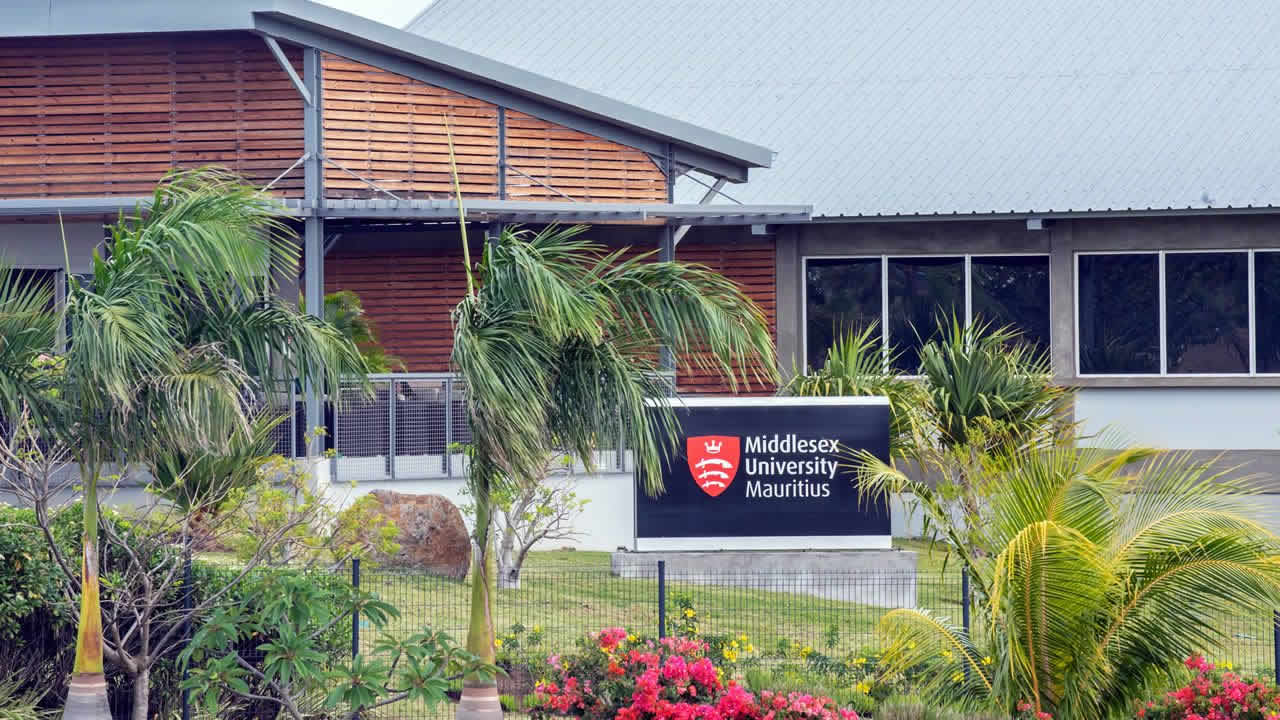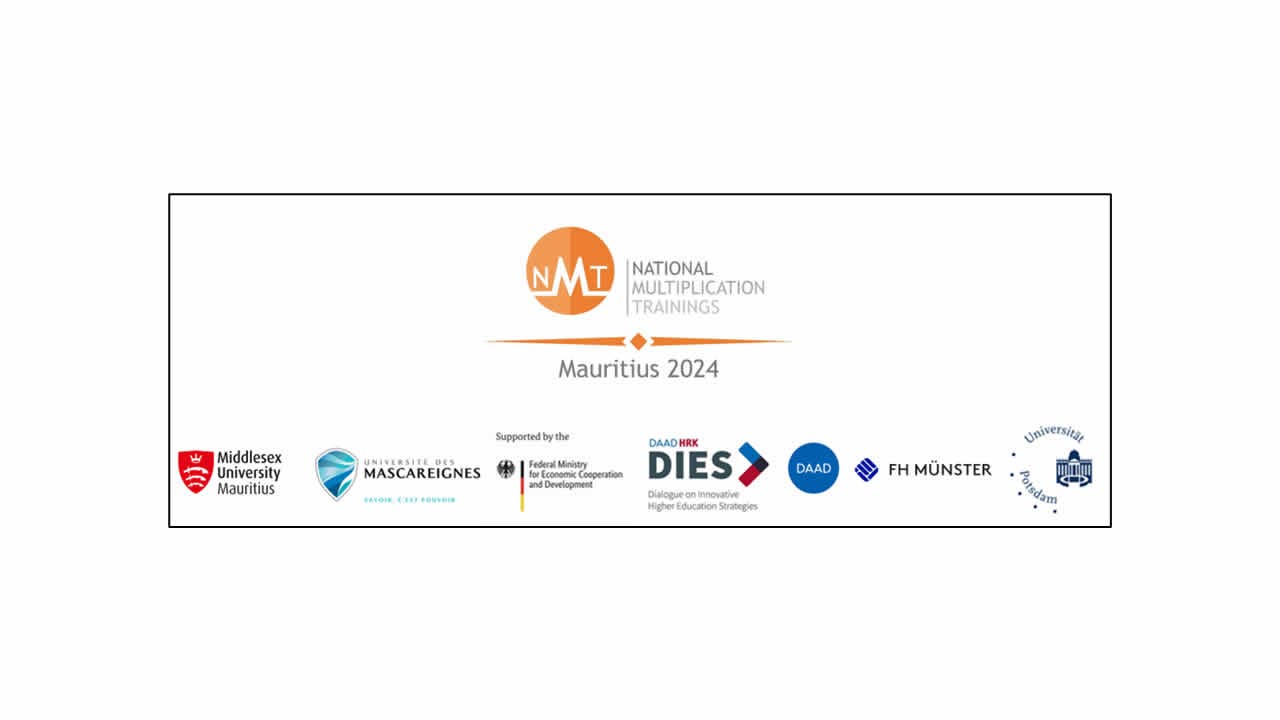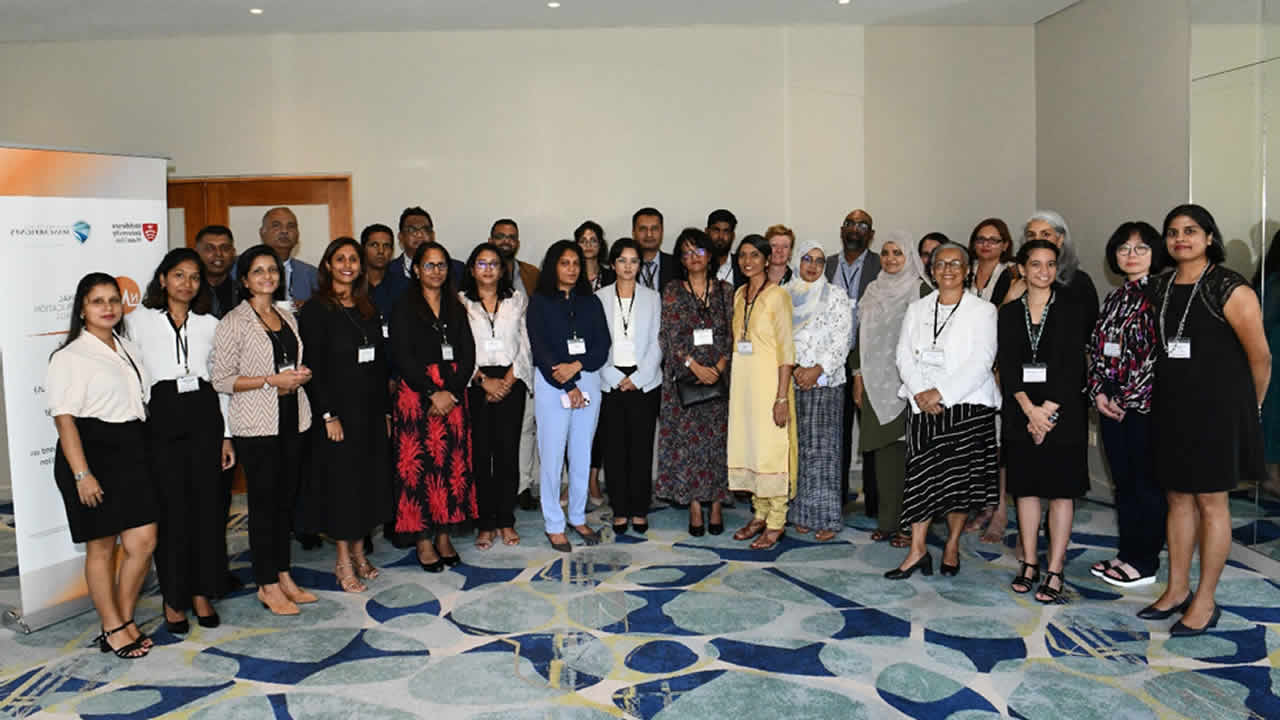
The first National Multiplication Training in Mauritius is a testament that higher education institutions can support the work of national regulators and actively champion national agendas and reforms through capacity building, peer learning and collaborative exchanges. A North-South, private-public partnership helped to achieve these outcomes.
As Mauritius positions itself to be a regional knowledge hub in Africa, improving the quality of international higher education and transnational education provision is paramount. But how best to achieve this? For Mauritius, a North-South private-public partnership provided part of the answer.
From 2023-2025, a collaboration between Middlesex University and Université des Mascareignes, both in Mauritius, with the University of Potsdam and FH Münster – University of Applied Sciences, both in Germany, empowered university staff to be agents of innovation and make a tangible impact on practice and policy with a particular focus on their institutions’ internal and external quality assurance and enhancement.
The collaboration was the first Dialogue on Innovative Higher Education Strategies (DIES) National Multiplication Training (NMT) for higher education in Mauritius, with the main goal being to support higher education managers in improving the procedures for quality assurance and internationalisation of the curricula in their institutions. The DIES programme is jointly coordinated by the German Academic Exchange Service (DAAD) and the German Rectors‘ Conference (HRK) and funded by the German Federal Ministry for Economic Cooperation and Development (BMZ).

Reform of the regulatory framework
The National Multiplication Training came at an opportune time, when Mauritius’ higher education institutions were at different stages of implementing reforms under the country’s Higher Education Act 2017.
Changes in the sector’s regulatory system ensured that the higher education programme provision offered in Mauritius not only met the requirements of its own statutory quality assurance bodies but was also benchmarked against regional and international standards, thereby fostering global academic mobility.
Stakeholders would be assured that higher education gained in Mauritius had international recognition whilst meeting regional labour market needs and socio-economic demands.
Regulation
When the 2017 Act was implemented in Mauritius in January 2020, two regulatory bodies, the Higher Education Commission (HEC) and the Quality Assurance Authority (QAA) were established.
Each was tasked with overseeing distinct but complementary regulatory functions, with greater mandates than the Tertiary Education Commission, which they replaced.
The restructuring ensured that a fit-for-purpose framework was in place to manage anticipated developments in the higher education landscape, including internationalisation.
Challenges
These transformative changes brought their share of challenges for the country’s higher education institutions, prompting questions and introducing uncertainties among those tasked with their implementation.
For many institutions, this reform entailed redesigning internal procedures, introducing new tools, training faculty in understanding regulatory requirements and fostering a culture of internal quality improvement; all while balancing existing operational demands.
As a result, many higher education institutions are navigating a steep learning curve, as they adjust to the new expectations set by the regulatory bodies.
Prior to the enactment of the new legislation, public and private higher education institutions were regulated through different mechanisms under the former Tertiary Education Act 1988. The 2017 Act thus addressed the need for harmonising quality assurance and accountability across the growing higher education sector by establishing a unified regulatory framework.
It was amid these challenges that the first DIES NMT for higher education in Mauritius was set up in 2023, enabling the collaboration that supported higher education managers to meet the complexities of these reforms and to implement the changes required.
First NMT in Mauritius
Breaking new ground, the National Multiplication Training, or NMT, distinguished itself from other national quality assurance workshops conducted by the regulatory bodies.
This was the first time that a private and a public university came together in a consortium to support Mauritius’ higher education quality assurance transformation on a national scale. The training was done by local practitioners from the public and private higher education sectors for their peers.
As alumni of the 2020-21 DIES Training on Internal Quality Assurance in Higher Education, or TrainIQA, programme for the Southern African Development Community, or SADC, region, the authors of this commentary (Dr Sweta Rout-Hoolash, a senior lecturer in international education from Middlesex University Mauritius and Vimi Neeroo Lockmun-Bissessur, the head of quality assurance from Université des Mascareignes), formed a national training committee (also including Dr Shaheen Motala-Timol, the head of academic and quality enhancement, Middlesex University Mauritius).
The committee was further expanded to include Petra Pistor, an international quality assurance expert from the Wandelwerk, Centre for Quality Assurance and Enhancement at FH Münster – University of Applied Sciences.
The committee conceptualised a multiplication training for capacity building on ‘Effective implementation of quality management systems in HEIs with a focus on accreditation, audit, and an introduction to internationalisation’.
Through capacity building, the project addressed the United Nations Sustainable Development Goal (SDG) 4, namely to “Ensure inclusive and equitable quality education and promote lifelong learning opportunities for all” as well as SDG 17 “Partnerships for the goals”, bringing together Mauritian and German public and private HE managers and practitioners.
The committee announced and publicised the training in January 2024 and selected twenty-two participants (twelve women and seven men, all Mauritian) based on predefined selection criteria.
Each represented a different role in their organisation. Ten higher education institutions took part, a mix of public and private, and a tertiary regulatory body. Following the DIES training course methodology, the training consisted of two interconnected in-person workshops of three to four days each, held in February and June 2024, with a break of four to five months between the workshops, for the participants to develop and implement projects relevant to their institutions.
Making innovative change sustainable
The workshop topics were selected by the participants to support the adaptation of reforms in their own institutions. The focus was on key areas such as development of a quality culture, review of audit and accreditation processes, and curriculum design to cater for an international student body.
To promote the sustainability of the National Multiplication Training, participants implemented a quality assurance project relevant to their institutions during the training, working in peer groups under the mentorship of an expert. Themes included student engagement in quality mechanisms; digital transformation; programme review, monitoring and audit.
The effectiveness of the training was evidenced from the end-of-training survey results: 94% of the participants agreed that “the experience of the trainers contributed to make the workshop an enriching one” and 100% agreed that the “workshop revealed new types of practical examples that could be used within the context of their own work”.
Moreover, the training committee was an all-female team, which was greatly appreciated by participants, exemplified through this comment from a participant at the closing survey, where it was stated that “the teamwork of the four ladies was brilliant. I sincerely learned a lot. The enthusiasm and dynamism of the leading four ladies was infectious and carried the workshop all along. The workshop was brilliantly carried out.”
Community of practice envisaged
To sustain a professional network, participants wanted to continue the dialogue with each other. A community of practice is intended to complement the recently established network for quality managers in Mauritius (the Higher Education Quality Assurance Society, or HEQAS), working independently to promote exchange across functional and disciplinary boundaries in the further implementation of the participants’ change projects.
As well as a growth in competencies among the participants, an institutional impact is expected from their change projects which will contribute to the implementation of the higher education reforms in Mauritius.
Higher Education leaders
The training attracted the interest of the national and regional media and, crucially, of higher education decision makers in Mauritius, including the former vice prime minister and minister of education, tertiary education, science and technology, who explicitly supported the initiative, along with heads of the HEC, QAA and other senior officials from the tertiary sector.

The NMT project was further recognised at national level, when in 2024 Middlesex University Mauritius and Université des Mascareignes won the bronze award in the category of ‘Government departments, parastatals and registered associations’ at the National Productivity and Quality Excellence Award.
Keeping the momentum
How can this momentum now be leveraged, and what practical steps can be taken to further support Mauritius’ higher education reforms efforts?
Based on the experiences from the first National Multiplication Training in Mauritius, the training committee recommends the following.
• Support the transformation process through capacity building: Changes in higher education systems do not happen overnight. Responsibilities must be defined, and all stakeholders need to be convinced of the new processes. This makes continuous guidance and shared learning in these processes more important, which suggests the implementation of additional training in the areas of higher education management, quality management, and internationalisation.
• Dialogue from practice for practice: This National Multiplication Training has demonstrated the value of cross-functional and cross-disciplinary exchange among practitioners. Through networking and the provision of training by practitioners themselves, these benefits can be further leveraged for Mauritius’ higher education reforms process.
• International exchange: Mauritius aims to become a regional knowledge hub. In pursuit of this goal, international exchange in higher education and quality management (beyond the development of international study programmes) is important.
The involvement of colleagues from Germany provided a great source of exchange and inspiration during the National Multiplication Training. At the same time, the training was entirely the responsibility of national experts.
This is particularly important when it comes to implementing a reform and internationalisation concept that fits the national context in Mauritius.
This North-South private-public partnership, enabled through the National Multiplication Training funds, was a first, but not the last such collaboration, aimed at creating a culture of sharing to meet national higher education objectives and improve the quality of higher education institutions.
The first National Multiplication Training in Mauritius is a testament that higher education institutions can support the work of national regulators and actively champion national agendas through capacity building, peer learning and exchanges.
Dr Sweta Rout-Hoolash, PFHEA is a Principal Fellow of the Higher Education Academy (United Kingdom), an alumna of DIES, a senior lecturer in international education at Middlesex University, Mauritius. She can be reached at [email protected] and on LinkedIn at https://www.linkedin.com/in/sweta-rout-hoolash
Vimi Lockmun-Bissessur (MSc (UK), BEng (UK), ACGI (UK)), is an Associate of the City and Guilds of London Institute (United Kingdom) and a DIES alumna. She is head of quality assurance at Université des Mascareignes, Mauritius. She can be reached on [email protected] or LinkedIn at https://www.linkedin.com/in/vimi-lockmun-bissessur
Dr Shaheen Motala-Timol is the head of academic and quality enhancement at Middlesex University, Mauritius. She is available at [email protected] or via LinkedIn at www.linkedin.com/in/shaheen-motala-timol
Dipl.-Foto-Des. Petra Pistor, M.A. (Germany) is an international quality assurance expert at the Wandelwerk, Centre for Quality Assurance and Enhancement at FH Münster – University of Applied Sciences. Her email is [email protected] and she can be contacted on LinkedIn at www.linkedin.com/in/petra-pistor
This commentary/opinion article was first published in the Africa edition of University World News. Here is a link to the article: https://www.universityworldnews.com/post.php?story=20250319100406602
 J'aime
J'aime














